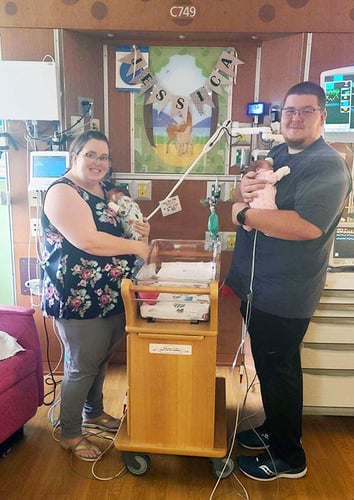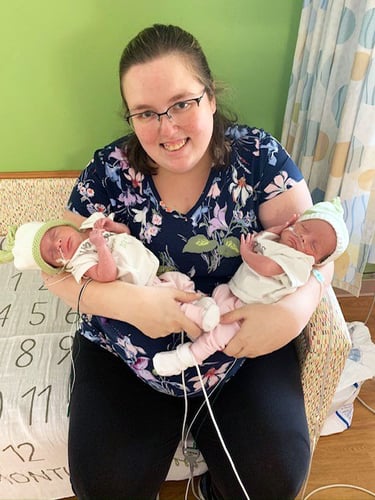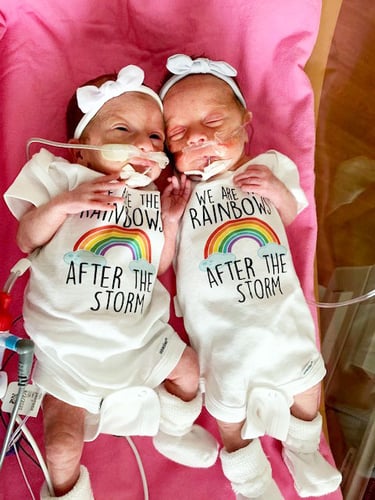
Heartbreak and miracles: One family’s journey with prematurity
Sydney and Jared were shocked. After years of wondering if they could even get pregnant, they found out they were pregnant with not one baby, but two. Twins.
One year earlier, Sydney gave birth to a miracle, little Claire. Claire was born more than five months prematurely. Heartbreakingly, Sydney and Jared had prepared for the worst and knew she wouldn’t live long. They spent 23 beautiful minutes with her before she passed.
“We were so thankful for those 23 minutes with Claire. We weren’t sure we’d get any time with her at all,” said Sydney. “She was our miracle. We had struggled with infertility, and without Claire, we wouldn’t have known it was possible to have children and it wouldn’t have led us to our twins.”
With endometriosis, a painful disorder where tissue forms outside the uterus, Sydney previously had to have a fallopian tube removed, so they didn’t know if it was possible for her to get pregnant at all. But Claire changed everything, and Sydney and Jared were even more hopeful for children one day.
A closely monitored pregnancy
 As soon as the couple found out they were pregnant, they began working with a team of people determined to help these twins not just survive, but thrive. That team included experts from Children’s Wisconsin and Froedtert & the Medical College of Wisconsin.
As soon as the couple found out they were pregnant, they began working with a team of people determined to help these twins not just survive, but thrive. That team included experts from Children’s Wisconsin and Froedtert & the Medical College of Wisconsin.
Their biggest concern was another premature birth, especially given they were having twins. According to the March of Dimes, 6,260 babies are born prematurely in Wisconsin and roughly 50 percent of twins nationwide are born preterm. To monitor the pregnancy, Sydney had ultrasounds every couple weeks. Thankfully, other than morning sickness and swelling in her legs, Sydney was doing well throughout the pregnancy.
At 30 weeks, the twins couldn’t wait to enter the world any longer. Sydney started having contractions and was admitted to the Froedtert Hospital Birthing Center, co-located with Children’s Wisconsin. A couple days later, on Sept. 2, 2020, the baby girls were delivered by C-section.
The twins, named Jenna and Jessica, were whisked off down the adjoining hallway from the Birthing Center to the Children’s Wisconsin NICU. Both Jenna and Jessica weighed less than 4 pounds when they were born, so they needed to be monitored while they grew big enough to see the world outside of the hospital.
Although premature, the great news was that Jenna and Jessica were otherwise healthy. As is common in newborns, both babies had jaundice, a high level of bilirubin that makes their skin and eyes look yellow, and were being treated with special light therapy. And their feedings were being monitored to make sure they were able to eat well and grow.
Congenital heart disease
 The NICU team worked with the Herma Heart Institute at Children’s Wisconsin to check on both Jenna and Jessica. Jenna had an atrial septal defect, or a hole in the wall that divides the upper chambers of the heart, while Jessica had a patent foramen ovale, which is a flap-like hole in the same location.
The NICU team worked with the Herma Heart Institute at Children’s Wisconsin to check on both Jenna and Jessica. Jenna had an atrial septal defect, or a hole in the wall that divides the upper chambers of the heart, while Jessica had a patent foramen ovale, which is a flap-like hole in the same location.
But that wasn’t the first time Sydney had worked with the Herma Heart Institute at Children’s Wisconsin. Back when she was about 7 years old, Sydney was the patient.
Sydney herself was born a little early and, unknown to her family at the time, had a congenital heart defect — aortic stenosis or a narrowing of the aortic valve opening, with Mitral Valve Prolapse or an issue with two valve flaps. At only 3 weeks old, she had a heart attack at the hospital she was born at in Arizona. Before turning 1, she had already had six different surgeries on her heart. And then at 7, she had open-heart surgery at the Herma Heart Institute.
“I knew Children’s Wisconsin and the Herma Heart Institute well, and had been working with Dr. Jennifer Gerardin for many years,” said Sydney. “From my previous experience with those teams, I felt it was the best place for us to get the best possible care for our twins when they were born.”
Going home amid the pandemic
 Sydney and Jared had already overcome so much, but to add to it, they had just welcomed their twins to the world during a global COVID-19 pandemic.
Sydney and Jared had already overcome so much, but to add to it, they had just welcomed their twins to the world during a global COVID-19 pandemic.
“Having the girls during a pandemic was especially hard because we weren’t able to see family, but we know it’s better to be safe than sorry,” said Sydney. “The NICU team helped us so much. We were first-time parents with babies coming home, so they helped prepare us and teach us everything we needed to know.”
After 40 days for Jessica and 45 days for Jenna, both twins were able to leave the hospital and go home. They went home with oxygen treatment as their lungs are still developing, but other than that, they’re doing very well. They are both growing and now weigh more than 6 pounds.
“We never planned to go through all of this — from my own heart surgeries, endometriosis and infertility, to losing a child, and now with twins born prematurely,” said Sydney. “But we knew it all led us to exactly where we needed to be.”
Sydney and Jared have been open to sharing their story and encouraging other families, especially around the March of Dimes’ World Prematurity Day on November 17.
“We learned so much, but the biggest thing was something their primary nurse, Anne Laessig, said to me,” said Sydney. “Premature babies are going to have milestones — some really big milestones some weeks and other that are small. But you have to understand that setbacks here and they are okay, too. As much as you want to rush, remember they’re exactly where they need to be. Celebrate the milestones and push through the setbacks.”
Children's Wisconsin Resources

Written by
Ashley Janzen
Writer
Related Stories
No related articles found.



